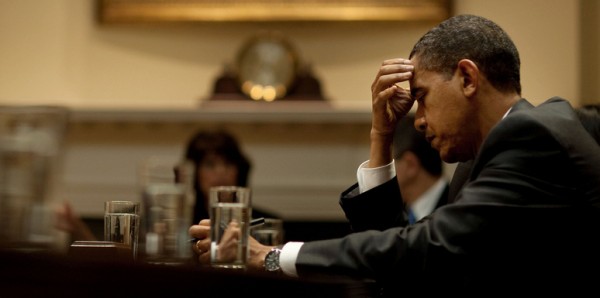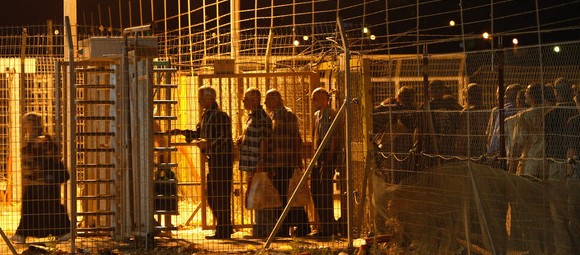
Back in the days when hazy-eyed neoconservatives stood like prophets laying out their vision of a democratic wave of Biblical proportions sweeping across the Middle East, Israel was supposedly the actualization of what elsewhere might be possible.
The problem was that since it came into existence, all the evidence suggested that the Jewish state, far from serving as a liberating force in the region, had actually done the opposite. It became the prime legitimizer of autocracy and stagnation.
Benjamin E Schwartz, in an article in the latest edition of The American Interest magazine, describes how Israel, rather than striving for a sustainable peace with its neighbors, sees its ability to survive as dependent on its ability to be divisive.
For a state that believes its legitimacy will always be questioned, survival is a higher imperative than stability and the pacification of threats more valuable than peace.
The power of Schwartz’s essay derives as much as anything from the fact that he is clearly in sympathy with the Zionist enterprise. His is neither an apology nor a criticism; it is a clinical analysis.
He writes:
When American diplomats talk about the road to peace, few Israelis dare articulate one awkward truth. The truth is that Israelis have managed their conflict with the Arabs and the Palestinians for half a century not by working to unite them all, but either by deliberately and effectively dividing them, or by playing off existing divisions. By approaching matters in this way, Israelis have achieved de facto peace during various periods of their country’s history—and even two examples of de jure peace. It is because of divisions among Palestinians that Israelis survived and thrived strategically in 1947–48, and because of divisions among the Arab states that Israel won its 1948–49 war for independence. Divisions among the Arabs and divided competition for influence over the Palestinians allowed Israelis to build a strong state between 1949 and 1967 without having to contend with a serious threat of pan-Arab attack. It was because of divisions and the strength of Egypt amid those divisions that Anwar Sadat decided to make a separate peace in 1979. It was because of another set of divisions that King Hussein was able to do the same in 1994.
The results of Israeli statecraft did not produce an American-style comprehensive peace, and it did not produce peace with the Palestinians. It may not even have produced a lasting peace with Egypt and Jordan—time will tell. But it did produce peace in its most basic and tangible form: an absence of violence and the establishment of relative security. This is what peace means for the vast majority of Israelis, most of whom do not believe that their Arab neighbors will ever accept, let alone respect as legitimate, a Jewish state in geographical Palestine. And the way Israelis have achieved this peace is, in essence, through a policy of divide and survive.
Schwartz then lays out in some detail the mechanisms through which Israel has implemented its divisive strategy — a strategy in which the control of Palestinian land, or at least the ability to rapidly enter and dominate it, is seen as a military prerequisite for defending Israeli land.
He concludes:
As a tiny country, Israel can only defeat its more numerous adversaries by breaking them into manageable pieces, or by behaving so that already broken pieces stay that way. Indeed, its geopolitical predicament mirrors that of the original Hebrew polity. It was the unity of hostile empires—Assyrian, Babylonian, Greek and Roman—that doomed ancient Israelite kingdoms. When its neighbors were divided, the First and Second Jewish Commonwealths did rather well.
There are three lessons here for American diplomats. First, Israelis will be reluctant to promote Palestinian social and economic unity, even if it is an essential precondition for strengthening Mahmoud Abbas’s moderate Fatah Party. The barriers and checkpoints that choke off the West Bank’s economic life and undermine Abbas’s popularity simultaneously inhibit rival Hamas from organizing its operatives. The Israelis have removed a good many checkpoints in recent months, and the local economy has thrived as a result. So far there have been few negative security implications. But American officials should expect that Israel will restore a greater degree of control if violence increases, and that there are strict limits to how far it will go to loosen its grip on the West Bank even without evidence of security deterioration.
Second, while the peace that America seeks—two states cooperating to ensure their mutual security—is the ideal political solution, it is operationally irrelevant so long as it also appears to be an improbable outcome. Governance in the West Bank is increasingly devolving to the local level, which critically undermines the Palestinian national project. Yet Israelis will allow and even promote this arrangement so long as local rule ensures near-term stability. Indeed, it benefits Israel for local rulers to be strong enough to control their own people, but weak enough not to challenge the Jewish state. It makes even more sense to the extent that anything better is judged to be unattainable for the foreseeable future.
Third, the geography of the land between the Mediterranean and the Jordan River, combined with the nature of contemporary warfare, dictate that Israel requires the presence of a security force it can trust in Palestinian territory. This means that the occupation will continue until Israelis come to trust the Palestinians, or at least some of them. Ultimately, this trust is the only viable foundation for a two-state solution. In the absence of it, American diplomats can expect all ambitious “high politics” peace initiatives to remain ethereal abstractions, Israelis to continue managing the conflict as they have long done and Palestinians to grow ever more fragmented. This is a formula for a local political life that may be nasty and brutish, but not necessarily short.
Or, to put Israel’s dilemma in slightly different terms which lead to the same conclusion: how can the Zionist state dispossess, divide and dis-empower the Palestinian people and then win their respect? After all, trust and respect do go hand in hand.

 As one pompous ass said to another on Monday: “I can think of few peoples who have contributed more to Western civilization than our two peoples. In both Rome and in Jerusalem, the foundations of Western culture were laid.”
As one pompous ass said to another on Monday: “I can think of few peoples who have contributed more to Western civilization than our two peoples. In both Rome and in Jerusalem, the foundations of Western culture were laid.”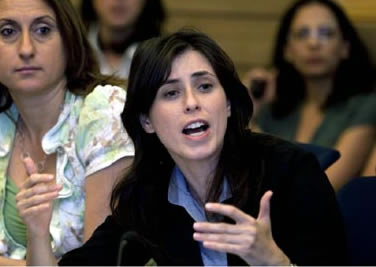 nesset Member Tzipi Hotovely, one of the leading dissenting voices in the Likud faction opposing the policy adopted by Prime Minister Benjamin Netanyahu, said Sunday that the territories should be annexed to Israel.
nesset Member Tzipi Hotovely, one of the leading dissenting voices in the Likud faction opposing the policy adopted by Prime Minister Benjamin Netanyahu, said Sunday that the territories should be annexed to Israel.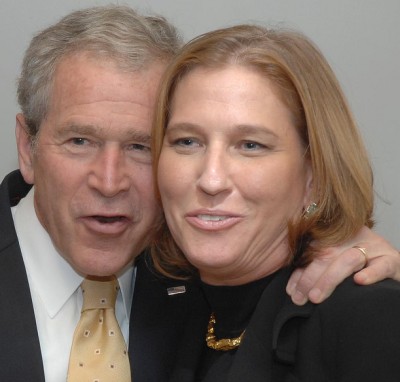 British court issued an arrest warrant for Israel’s former foreign minister over war crimes allegedly committed in Gaza this year – only to withdraw it when it was discovered that she was not in the UK, it emerged today.
British court issued an arrest warrant for Israel’s former foreign minister over war crimes allegedly committed in Gaza this year – only to withdraw it when it was discovered that she was not in the UK, it emerged today. he White House condemns the torching of a mosque, yet respectable Americans contribute to a yeshiva whose rabbi said it’s okay to kill gentile babies. It is no surprise that the American administration tacitly, if unenthusiastically, accepted the excuse that the map of national priority zones the cabinet approved on Sunday does not violate the decision to freeze construction in the settlements.
he White House condemns the torching of a mosque, yet respectable Americans contribute to a yeshiva whose rabbi said it’s okay to kill gentile babies. It is no surprise that the American administration tacitly, if unenthusiastically, accepted the excuse that the map of national priority zones the cabinet approved on Sunday does not violate the decision to freeze construction in the settlements.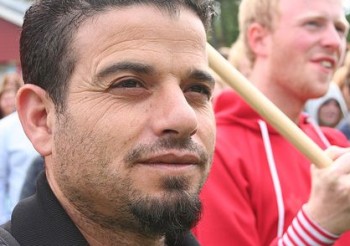 ohammad Othman, the BDS campaigner who was detained by Israel upon returning from a speaking tour in Norway, was given three months administrative detention yesterday in an Israeli military court. Othman had been held 63 days without charge before the court agreed to the prosecution’s request for administrative dentention. Othman has been under nearly constant interrogation during this time. [
ohammad Othman, the BDS campaigner who was detained by Israel upon returning from a speaking tour in Norway, was given three months administrative detention yesterday in an Israeli military court. Othman had been held 63 days without charge before the court agreed to the prosecution’s request for administrative dentention. Othman has been under nearly constant interrogation during this time. [
 plan by right-wing legislators in Israel to commemorate the anniversary this month of the death of Meir Kahane, whose banned anti-Arab movement is classified as a terrorist organisation, risks further damaging the prospects for talks between Israel and the Palestinians, US officials have warned.
plan by right-wing legislators in Israel to commemorate the anniversary this month of the death of Meir Kahane, whose banned anti-Arab movement is classified as a terrorist organisation, risks further damaging the prospects for talks between Israel and the Palestinians, US officials have warned.